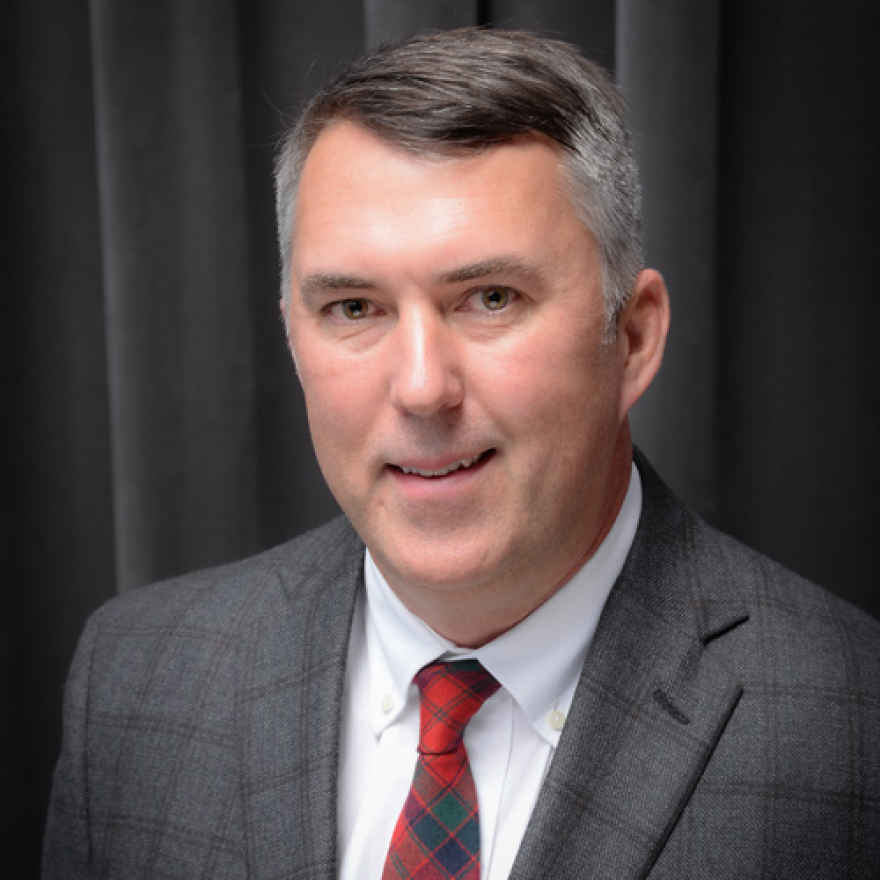When lawmakers passed SB49, known as the “Don’t Say Gay Bill” or the Parents Bill of Rights, in August through an override of Governor Roy Cooper’s veto, they provided a list of requirements for school policies but little direction on execution.
Now school systems across North Carolina, including the Asheville and Buncombe County districts, must decide whether and how to enforce a controversial state law that strengthens parental control and censures discussion around LGBTQ+ topics at public schools.
The law requires schools to notify a parent or guardian if their child changes their name or pronouns and bans instruction on gender identity or sexuality in kindergarten through fourth grade. It also requires parental approval for some medical care including mental health counseling.
Under the new statute, parents and guardians have the right to inspect textbooks and review materials their child has borrowed from a school library, and the right to consent or withhold consent for participation in reproductive health and safety education programs.
If parents take issue with a topic or activity, they can complain to the school in writing and, in some cases, bring that complaint to the state.
Buncombe County Schools, the largest school system in Western North Carolina and the 13th largest public school system in the state, approved implementation of the measure for all 45 schools at the Dec. 7 meeting.
The policy requires parental notification when a student changes their name or pronouns, with the caveat that “school employees must be mindful that transgender and gender nonconforming youth may experience family challenges” and that “some transgender students have not talked to their parents to know about their transgender status based on concerns about a lack of acceptance or safety.”
“This bill will not make kids any less gay. It will just make them better at hiding it, effectively severing any trust that could and has existed between students and their teachers.” - Aspen Johnson, educator
In a situation where a student has safety concerns, the school principal may speak with the student first and address the situation on a “case-by-case basis.”
For some members of the Buncombe community, the measure goes too far.
“For many, schools are a place where they can escape the oppression faced at home by bigoted family members, often confiding in peers or trusted teachers as they begin to explore their gender identity,” Aspen Johnston, a local educator, told the Buncombe County School Board at the Dec. 7 meeting.
Students, teachers, and mental health professionals spoke about how the policies could create a hostile environment.
“This bill directly threatens the trust the school environment can hold, instead turning students towards secrets and shame,” Johnson said. “This bill will not make kids any less gay. It will just make them better at hiding it, effectively severing any trust that could and has existed between students and their teachers.”
For others, the policies did not go far enough. At the meeting, proponents of SB49 wore stickers emblazoned with red font that read, “No Secrets.” They called for the district to tighten up its policy language to further guarantee parental access to information about their children, including a direct notification process for when students change names and pronouns.
“Parents, not school personnel, are directors of their children's care and their moral training and to fulfill their legal and moral responsibility, parents need to know what's going on with their child so that they can help,” Stacey Metcalf, said at the meeting.
“Nothing good comes out of lying and nothing good comes from secrets. Evil lies in that darkness. This non-compliant verbiage to parents conveys that Buncombe County Public Schools has the right to withhold information from parents, and in effect, lie to them,” Metcalf said.
Several speakers who opposed SB49 cited statistics from The Trevor Project, an LGBTQ-focused nonprofit whose annual survey notes alarmingly high suicide rates for LGBTQ youth, with nearly half of those surveyed reporting they have seriously considered suicide in the past year.
According to the study, nearly 2 in 3 LGBTQ young people said that hearing about potential state or local laws banning people from discussing LGBTQ people at school made their mental health a lot worse.

School leaders wrestle with competing pressures
The new statute requires a myriad of controversial changes, creating a tightrope that school leaders must walk.
Republican State Superintendent Catherine Truitt called the timeframe for schools to put the changes in place “less than ideal” and requested a delay of the implementation. The state budget bill moved the deadline for some of the changes from October 1, 2023 to January 1, 2024, but the task remained difficult for school leaders on the ground.
Rob Elliot, chairman of the policy committee for the Buncombe County Board of Education, told BPR that figuring out how to enforce SB49 has been “very stressful” and a “noisy, big, complex legal discussion.”
Despite the complicated logistics, Elliot said he felt it was important for the school board to implement some form of the measure.
“A lot of folks have asked that question. Like why don't you just hold off? Why don't you just wait another month or another month after that and see what happens? Because there could be legal challenges,” he said. “We just felt the responsible thing to do for our staff and our students was to go ahead and get this policy work going, which we will continue to work on.”
While new policies will limit “instruction on gender identity, sexual activity, and sexuality instruction” in curriculum, Elliot said the district will not restrict library books and voluntary classroom materials that are “simply representational” of LGBTQ families and individuals for K-4 classrooms.
“We don’t by any means intend to eliminate books that may just be representational of families and students that are members of our school,” he said.
When it comes to mental health access, the new policy toes the line between parental consent and student safety, citing that notification and permission is not required for “short-duration” or “student-initiated” counseling, as well as “crisis intervention.”
The policy changes prompted three local LGBTQ+ advocacy organizations –Youth Outright, Campaign For Southern Equality, and PFLAG Asheville– to file a Title IX complaint to the board. Title IX is the federal law that prohibits discrimination on the basis of sex in any school that receives federal funding.
The complaint asserts that the new policies create a “hostile educational environment” and violate Title IX’s “obligations to provide every student with a safe and non-discriminatory environment.”
Craig White, the supportive schools director at Campaign For Southern Equality, told BPR that Buncombe has “made an effort at what I would describe as minimal compliance, complying with the requirements of the state law but in a way that really tries to minimize the harm caused to LGBTQ students and families.”
The groups asked for Buncombe’s Title IX coordinator to “delay all implementation” of the SB49 policies that have been passed by the Buncombe school board until “the federal complaint against DPI and SBE has been resolved.” Craig said his team expects to file said federal complaint in January.
Title IX coordinator Shanon Martin declined an interview request.
Elliot told BPR he believes the new law is “in friction” with Title IX, but he also cited the Supremacy Clause from the US Constitution, noting that state laws “don’t absolve us from adhering to federal laws.”
“We don't exist just under the confines of this one new law [SB49]. This doesn't define our entire world. We exist under a whole universe of federal law and state law, all of which we have to abide by as well.”
When asked if he would describe Buncombe’s policy as “minimal compliance,” Elliot demurred.
“I'm not really sure where we fall. We obviously don't fall on the side of no compliance,” he said.
“We [are] complying with the parents Bill of Rights Law in the context of all other state and federal law that we are called to abide by, while also ensuring that our own core values as a school system are represented.”

Asheville school board takes slower approach
George Sieburg, chair of the Asheville City Board of Education, told BPR that he wishes “no district would have swiftly moved on these policies,” but understands that some districts might feel pressure from the General Assembly to move forward.
“The General Assembly has much more power over education in North Carolina, I feel, than other General Assemblies have in other states,” he said.
To Sieburg, the intent of the law is to “silence the voice of our students who are transgender or gender fluid.”
Unlike neighboring districts, including Buncombe and Macon County, Asheville City Schools has not implemented policies from SB49, with the exception of one provision that allows parents to “inspect and review particular instructional materials” and requires a principal to respond to a parent’s request for materials within 10 business days and deliver material within 20 business days.
Asheville leaders plan to evaluate the issue at a retreat on Friday, Jan. 6.. Sieburg said public comment will be available at the retreat.
“We understand that there are going to be some policies that we have to enact,” he said, but he said he remains hopeful the school board will also be able to enact policies and procedures that “explicitly show we’re going to support our students through this.”



